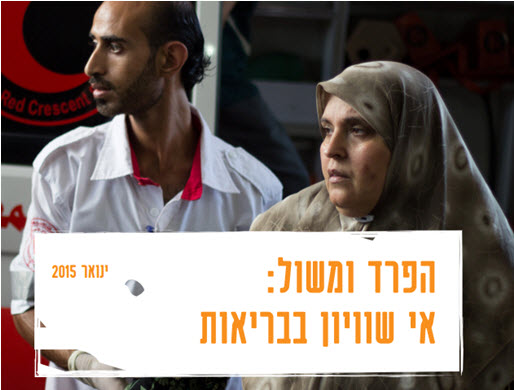For the first time, a report by the Israeli branch of Physicians for Human Rights analyses the health metrics gaps between Israeli citizens and residents of the Palestinian Occupied Territories (OPT). According to the report, Palestinians live 10 years less than Israelis, infant mortality is five times higher than in Israel, and the mortality of women at childbirth is four times as high. “
Divide and Conquer: Inequality in Health, a new report by Physicians for Human Rights – Israel, published on Friday, January 9, is the first to compare health conditions in the OPT and in Israel using health indicators and socioeconomic determinants of health that influence the residents’ ability to exercise their right to health.
The report publishes findings pointing to significant gaps between indicators for the two populations: For example, it was found that the average life expectancy for Palestinians is about 10 years less than for Israelis; that infant mortality is five times higher in the OPT than in Israel (18.8 deaths per 1,000 births as compared to 3.7); and that maternal mortality is four times higher in the Occupied Territories than in Israel (28 deaths per 100,000 births as compared to 7).
Significant gaps were also found in financing, services provided, and available manpower between the two healthcare systems. For example, it was found that the national expenditure on health care per person in the OPT is about one eighth of that in Israel. The number of physicians per 1,000 residents in Israel (3.33) is higher than that in the Palestinian territories (2.08); the number of specialists is eight times higher in Israel than in the OPT (1.76 as compared to 0.22); and the number of nurses in Israel is 4.8 per 1,000 residents, compared with only 1.9 nurses in the Occupied Territories. It was also found that some inoculations given in Israel are not given in the OPT, for example against hepatitis A, chicken pox, pneumonia, rota virus, and human papillomavirus. This is in spite of the fact that infectious diseases are much more common in the Occupied Territories than in Israel.
The report also reviews the Israeli mechanisms of control which prevent the Palestinian Ministry of Health – which has its own faults – from providing full health services to the residents of the Occupied Territories, to the detriment of the latter’s health. One such mechanism of control is the limitations Israel imposes on the freedom of movement of patients, medical staff, and medications. Another is control of the Palestinian budget, including the health budget, through Israel’s control of the customs and Value Added Tax revenue for goods entering the Occupied Territories. Israel often makes use of this control level, and denies the transfer of these funds to the Palestinian Authority as a punitive measure. By doing so, Israel interferes with the financing of the Palestinian healthcare system and condemns it to exist in a state of uncertainty.
The Palestinian health system is in a state of chronic crisis, one which does not allow it to provide an appropriate response to the needs of the population. At the foundation of the report is the argument that the crisis engulfing this system did not develop overnight, but rather is closely related to Israeli control of the Occupied Territories. Despite the hopes that came with the Oslo Accords, in practice, for two decades now, a situation exists in which two populations live in one territory, under one government, but with different rights. Mor Efrat, a coordinator at the Occupied Territories Department of Physicians for Human Rights – Israel said: “It is the duty of the Palestinian Ministry of Health to provide health services to the population to the best of its ability, but it is Israel’s obligation to provide all the services that exceed the ability of the Ministry of Health, so that a Palestinian child and an Israeli child, who may live only a few hundred yards apart, receive equitable medical care.”
The full report online (47 pages, English): Divide & Conquer: Inequality in Health (January 2015)



